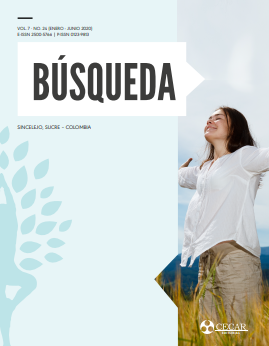Abstract
The Family Psycho-Affective Bond is considered a fundamental concept in the social and affective development of the human being, which has been studied by the human sciences with great thoroughness and detail. Similarly, there is a great documentary review of this topic and its relationship with the teaching-learning processes. However, in the praxis of education, the Family Psycho-Affective Bonds take second place and it is the cognitive processes that take on relevance, disarticulating this psychological pair on which the success of training throughout life depends. Therefore, it is noteworthy that the transition from Face-to-Face Education to Virtual and Remote Education, in the context of the Covid-19 Health Emergency that the entire world is experiencing, has been a great challenge for Teachers, Parents, Students and Educational System. However, this situation has forced the school to move to the simplicity of the home, and with it, the essence of Family Psycho-Affective Bonds in pedagogical processes and the involvement of the family in the integral formation of the human being, is retaken. Therefore, this reflective article aims to analyze the importance of the Family Psycho-Affective Bond in the transition from Face-to-Face Education to Virtual and Remote Education, in the framework of the Health Emergency due to the Covid-19 Virus, and the author supports his criteria in the need to articulate —in the Children and Adolescents— the affective processes with the cognitive ones in this new form of education from home, concluding that, this new teaching approach, based on the synchronicity of these two components, opens up the possibility of an educational revolution. Throughout this article, two fundamental positions will be addressed: first, a succinct theoretical explanation of the dysfunctionality of the Family and School Psycho-Affective Bond in Traditional Education is presented. And, on the other hand, the need to reconstruct the Affective Bond in the transition from Face-to-Face Education to Virtual and Remote Education, within the framework of the Health Emergency due to the Covid-19 Virus.
Keywords:
Licence

This work is licensed under a Creative Commons Attribution-ShareAlike 4.0 International License.
References
Bolívar, A. (2006). Familia y Escuela: dos mundos llamados a trabajar en común. Revista de Educación, 339, pp. 119-146. http://www.revistaeducacion.mec.es/re339.htm
Bowlby, J. (2006). Vínculos afectivos: formación, desarrollo y pérdida. Ediciones Morata, S. A.
Cava, M. J.; Musitu, G.; Murgui, S. (2006). Familia y violencia escolar: el rol mediador de la autoestima y la actitud hacia la autoridad institucional. Psicothema, 18 (3): 367-373. https://www.redalyc.org/articulo.oa?id=727/72718306
Flórez, G., Villalobos, J., Londoño-Vásquez, D. (2017). El acompañamiento Familiar en el proceso de formación escolar para la realidad colombiana: de la responsabilidad a la necesidad. Revista Psicoespacios, Vol. 11, N. 18. http://revistas.iue.edu.co/index.php/Psicoespacios
Fonagy, P. (1999). Persistencias transgeneracionales del apego: una nueva teoría. Aperturas Psicoanalíticas, nº 3. https://aperturas.org/articulo.php?articulo=0000086
Garcia, B. (2009). Las Dimensiones Afectivas de la Docencia. Revista Digital Universitaria, 10(11). http://www.revista.unam.mx/vol.10/num11/art71/art71.pdf
García, J. (2010). La relevancia de la función Educadora de la Familia. Revista digital innovación y experiencias educativas, 45, pp. 2-7. http://publicacionesdidacticas.com/hemeroteca/articulo/068028/articulo-pdf
Hervas, E. (2008). Relación Familia Escuela. Revista digital: innovación y experiencias educativas, 13, p. 7. http://www.csi-csif.es/andalucia/mod_ense-csifrevistad.html.
Lafuente, J. (2000). Patrones de Apego, pautas de interacción familiar y funcionamiento cognitivo. Revista de psicología general y aplicada, 53(1), 165-190. https://dialnet.unirioja.es/servlet/articulo?codigo=2356868
Manrique-Palacio, K. P., Zinke, L., & Russo, A. R. (2018). Pisotón: un programa de desarrollo psicoafectivo, como alternativa para construir la paz. Revista Latinoamericana de Ciencias Sociales, Niñez y Juventud, 16(1). https://www.redalyc.org/jatsRepo/773/77355376008/html/index.html
Ministerio de Educación Nacional (2007). Guía n° 26. Cartilla para padres de Familia. ¿Cómo participar en los procesos educativos de la Escuela? https://www.mineducacion.gov.co/1759/articles-120646_archivo_pdf.pdf
Ospina, H., Cano, A. (2016). Educación popular y género: mirada desde América Latina y el Caribe. En: Ospina, H., Ramírez-López, C. (ed.). Pedagogía crítica latinoamericana y género. Siglo del Hombre Editores.
Pérez Contreras, B. y Arrázola, E. T. (2013).Vínculo afectivo en la relación parento-filial como factor de calidad de vida. Tendencias y Retos, 18(1), 17-32. https://dialnet.unirioja.es/servlet/articulo?codigo=4929410
Pérez, D., Londoño, D. (2015). La influencia de la Familia en el desempeño académico de los y las adolescentes del grado sexto en tres instituciones de Antioquia. Revista Psicoespacios 9(15), pp. 215-233. http://revistas.iue.edu.co/index.php/Psicoespacios/issue/view/36/showToc
Quintero, M., Sánchez K. y Mateus J. (2015). Pedagogía de las Emociones Para la Paz. https://repositorio.idep.edu.co/handle/001/251
Real Académica Española (2014). Diccionario de la Real Academia Española. RAE. https://dle.rae.es/
Romero, G., Martínez, J. y Londoño, D. (2017) El Acompañamiento Familiar En El Proceso De Formación Escolar Para La Realidad Colombiana: De La Responsabilidad A La Necesidad. Revista Virtual de Ciencias Sociales y Humanas, 11(18). https://doi.org/10.25057/21452776.888
Suárez Guerrero, C. (2004). La zona de desarrollo próximo, categoría pedagógica para el análisis de la interacción en contextos de virtualidad. Pixel-Bit. Revista de Medios y Educación, (24): 5-10. https://www.redalyc.org/articulo.oa?id=368/36802401.
Suárez, J., Urrego, L. (2014). Relación Familia-Escuela: Una mirada desde las prácticas pedagógicas rurales en Anserma, Caldas. Revista Latinoamericana de estudios de Familia, 6, pp. 97-113. http://vip.ucaldas.edu.co/revlatinoFamilia/downloads/Rlef6_6.pdf
Vernengo, P. (2009). Apego. Psicoanálisis Ayer y hoy. https://www.elpsicoanalisis.org.ar/old/numero4/resenaapego4.htm
Zubiria, J. (04/06/2020). La Educación en Tiempos de Cuarentena. Revista Semana. https://www.semana.com/opinion/articulo/la-educacion-en-tiempos-de-cuarentena-columna-de-julian-de-zubiria/661969
Zubiria, J. (15/03/2020). Lecciones Pedagógicas del Coronavirus. Revista Semana. https://www.semana.com/opinion/articulo/lecciones-pedagogicas-del-coronavirus-columna-de-julian-de-zubiria/656986


 PDF (Español (España))
PDF (Español (España))
 EPub (Español (España))
EPub (Español (España))
 HTML (Español (España))
HTML (Español (España))



